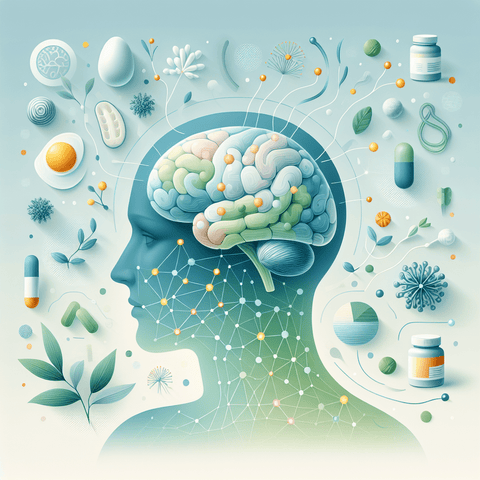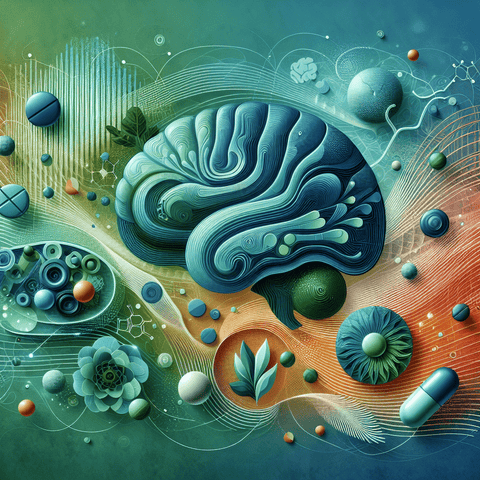Published on topvitamine.com
Understanding Vitamin B12 in Nutritional Supplements: Essential for Brain Function and Well-being
Vitamin B12, also known as cobalamin, is a water-soluble vitamin that plays a vital role in numerous biological processes essential for maintaining optimal health. Its significance extends beyond basic bodily functions, directly impacting the health and functionality of the brain and nervous system. As an integral component of many nutritional supplements, B12 is often highlighted for its contribution to cognitive health, neuroprotection, and overall well-being.
Stored primarily in the liver, B12 is unique among vitamins because of its ability to be stored in the body for extended periods. This storage capacity underscores the importance of consistent intake, as deficiencies typically develop over years of inadequate consumption. The vitamin is naturally found in high-protein foods, including animal products such as meat, fish, poultry, eggs, and dairy. For vegetarians and vegans, B12 intake can be challenging, making supplementation a practical approach to prevent deficiency and support brain health.
At a cellular level, vitamin B12 is essential for DNA synthesis, red blood cell formation, and neurological functions. It acts as a cofactor for key enzymatic reactions, including methylmalonyl-CoA mutase and methionine synthase. These enzymes are crucial for maintaining methylation processes, which influence gene expression, neurotransmitter synthesis, and myelin formation—an insulating layer necessary for proper nerve conduction.
The neurological importance of B12 cannot be overstated. Myelin sheath integrity facilitates the rapid transmission of nerve impulses, making it essential for sensory, motor, and cognitive functions. Deficiencies in B12 can lead to neurological symptoms such as numbness, tingling, muscle weakness, and cognitive disturbances, emphasizing the vitamin's role in preserving neural health. Recognizing this, many healthcare providers recommend B12 supplementation for individuals at risk of deficiency, including older adults, vegans, and those with absorption issues.
H2: Vitamin B12 in Scientific Research highlights its role in supporting mental functions. Studies consistently show that adequate B12 levels correlate with improved memory, mood stability, and cognitive resilience. It is a key nutrient in the creation of neurotransmitters such as serotonin, dopamine, and norepinephrine—chemicals that regulate mood and mental clarity.Vitamin B12 Supplementation: How to Optimize Your Intake for Maximum Benefits
Optimizing B12 intake involves understanding the different forms available and selecting the most appropriate for your specific needs. The most common forms include cyanocobalamin, methylcobalamin, hydroxocobalamin, and adenosylcobalamin, each with distinct characteristics influencing absorption and efficacy.
Injections, typically administered by healthcare professionals, offer a direct route to bypass absorption issues in the gastrointestinal tract. They are especially effective for individuals with absorption problems, such as those with pernicious anemia or gastrointestinal disorders. Oral tablets, sublingual lozenges, and sprays provide convenient options for daily supplementation, with sublingual forms often preferred for their increased bioavailability. Studies suggest that sublingual B12 can be absorbed efficiently, making it a popular choice for many seeking to enhance cognitive health.
Recommended dosages vary based on age, health status, and existing deficiencies. For adults with no deficiency, a daily intake of around 2.4 micrograms is generally sufficient; however, higher doses are often recommended for deficiency correction or specific health goals. For instance, older adults and vegetarians might require supplement dosages ranging from 25 micrograms to several hundred micrograms daily, depending on their levels and medical advice. Pregnant and breastfeeding women also need increased amounts to support both their own neurological health and fetal development.
When choosing a high-quality B12 supplement, it’s essential to review labels carefully. Products should specify the form of B12, purity, and dosage, and ideally be manufactured by reputable companies adhering to Good Manufacturing Practices. Additionally, selecting supplements free from unnecessary binders, preservatives, or artificial additives ensures better safety and efficacy. For those concerned about absorption, methylcobalamin and hydroxocobalamin are highly bioavailable options.
Potential interactions are relatively minimal but worth noting. B12 supplements can interact with certain medications, including proton pump inhibitors, metformin, and certain antibiotics. Consulting a healthcare professional before initiating supplementation is advisable, especially for individuals on long-term medication regimens or with underlying health conditions. Safety considerations also include avoiding excessive doses, as extremely high intakes could rarely lead to adverse effects, although no significant toxicity has been associated with B12 supplementation.
Scientific evidence supports its role in cognitive enhancement and brain health. Incorporating B12 in your daily routine can optimize mental performance and neuroprotective benefits.
Supporting Your Brain with B12 is crucial for maintaining and enhancing cognitive function, memory, and mental agility. By ensuring optimal levels of this vital nutrient, you can take proactive steps toward lifelong mental resilience.
Neurological Support with B12: Safeguarding Your Nervous System
The importance of vitamin B12 extends deeply into the health of the nervous system. Nerve cells are highly dependent on adequate B12 levels for the synthesis and maintenance of myelin sheaths—protective coverings that insulate nerve fibers and facilitate rapid signal transmission. Without sufficient B12, myelin degeneration can occur, leading to neurological impairments manifested as numbness, tingling, or even cognitive decline.
Research underscores B12’s role in nerve regeneration and repair. It acts as a vital nutrient in healing nerve injuries and mitigating the progression of neurological disorders such as peripheral neuropathy. Supplementation has demonstrated potential in restoring nerve function and preventing long-term damage, especially in individuals with confirmed deficiencies.
Case studies and clinical trials reveal that B12 supplementation can improve nerve conduction velocities, reduce neurological symptoms, and enhance quality of life for patients with neurodegenerative conditions. Ensuring that B12 levels are maintained within optimal ranges is an important aspect of neurological health management, particularly for aging populations or those with malabsorption issues.
Maintaining neurological health isn't limited to supplementation alone. Lifestyle modifications, such as managing dietary intake, avoiding alcohol excess, and controlling chronic illnesses, complement the benefits of B12 for holistic nervous system support.
Mental Clarity and B12: Overcoming Brain Fog and Enhancing Focus
One of the most common manifestations of B12 deficiency is mental fog—an inability to concentrate, feelings of sluggishness, and overall cognitive slowdown. These symptoms are often overlooked or misattributed to stress or fatigue, yet they frequently stem from inadequate B12 levels impairing neurotransmitter synthesis and myelin integrity.
Nutritional strategies aimed at increasing B12 intake can significantly improve mental clarity. Supplementing with B12, especially in those experiencing subtle cognitive impairments, can restore energy levels, enhance focus, and reduce brain fog. Combining B12 with other brain-boosting nutrients like omega-3 fatty acids (DHA and EPA), magnesium, and vitamin D can produce synergistic effects, further optimizing neurofunction.
Personal stories from individuals who incorporate B12 into their routine often report noticeable improvements in their concentration, mental stamina, and mood. This is particularly relevant for students, professionals, and older adults seeking to maintain sharp cognitive performance.
Implementing daily B12 supplementation as part of a broader lifestyle approach, including physical activity, balanced nutrition, and mental exercises, can unlock your brain’s full potential and promote enduring cognitive vitality.
B12 Deficiency Recovery: Restoring Brain Health and Overall Vitality
Recognizing the symptoms of B12 deficiency is vital for early intervention. Common neurological and cognitive symptoms include memory loss, difficulty concentrating, depression, irritability, and numbness. Laboratory tests measuring serum B12, methylmalonic acid, and homocysteine levels assist healthcare providers in diagnosing deficiency, guiding treatment plans.
Early treatment with appropriate supplementation can reverse many neurological symptoms, preventing long-term damage. In cases of severe deficiency, intramuscular B12 injections are often prescribed initially, followed by maintenance oral or sublingual therapy.
Long-term recovery strategies involve consistent supplementation, monitoring B12 levels regularly, and making dietary modifications to ensure ongoing adequate intake. For vegetarians and vegans, plant-based B12 sources are limited; hence, fortified foods and supplements should be incorporated into daily routines. Additionally, lifestyle choices such as avoiding excessive alcohol, managing gastrointestinal health, and addressing malabsorption issues support sustained brain health.
By prioritizing B12 health management, individuals can regain vitality, mental clarity, and neurological resilience. The goal is to establish a sustainable, well-balanced approach to B12 intake that aligns with personal health goals and lifestyle considerations.
Conclusion: Unlocking the Full Potential of B12 for Your Brain’s Health
Vitamin B12 is more than just a nutrient; it is a cornerstone of cognitive resilience, neurological protection, and mental clarity. Its multifaceted role in supporting DNA synthesis, nerve health, and neurotransmitter production underscores its importance for lifelong brain vitality. Whether through dietary sources or targeted supplementation, ensuring adequate B12 levels is a proactive step toward optimizing mental functions and safeguarding neurological integrity.
For those seeking to enhance cognitive performance or recover from deficiency-related issues, personalized supplementation strategies can make a significant difference. Consulting healthcare professionals and choosing high-quality products ensures safety and effectiveness. As research continues to unveil new insights into B12’s benefits, incorporating this vital vitamin into your health routine remains a powerful way to unlock your brain’s full potential.
FAQs About B12 and Brain Health
- What are the signs of B12 deficiency affecting the brain?
- Common signs include memory lapses, difficulty concentrating, brain fog, fatigue, numbness, tingling, and mood changes.
- Can B12 supplementation improve cognitive functions?
- Yes, maintaining adequate B12 levels supports neurotransmitter synthesis and myelin health, which are critical for memory, focus, and mental agility. However, supplementation should be tailored to individual needs.
- What is the best form of B12 for brain health?
- Methylcobalamin and hydroxocobalamin are considered highly bioavailable and effective for neurological support. Choosing a reputable supplement is essential.
- Are there risks associated with B12 supplementation?
- Generally safe when taken within recommended dosages. Excessive doses are rare in causing adverse effects but should be discussed with a healthcare provider, especially if on medication.
- How can I prevent B12 deficiency?
- Consuming B12-rich foods or fortified foods, using supplements if necessary—especially for vegans—and managing health conditions that impair absorption are key strategies.
Important Keywords
- Vitamin B12
- Brain health
- Cognitive enhancement
- Mental clarity
- Myelin support
- B12 deficiency
- B12 supplementation
- Neurological health
- Memory boost
- Nervous system support
- Supplments for brain
- Best B12 form



